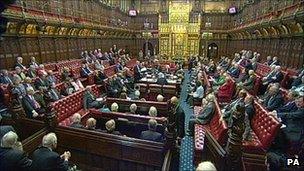UK's future is focus of Lords Scotland Bill debate
- Published

Members of the House of Lords debated the Scotland Bill into the early hours
The future of the United Kingdom dominated a House of Lords debate on the Scotland Bill which promises to boost powers at Holyrood.
Tory and former Scotland secretary Lord Forsyth of Drumlean called on the UK government to hold a referendum before introducing the powers.
The bill has been sent to the House of Lords for approval after being given an unopposed third reading in the Commons.
Holyrood could benefit from 拢12bn of financial powers if the bill is passed.
The legislation would allow the Scottish Parliament to set rates of income tax, although Westminster would continue to control rates of corporation tax and duties on alcohol and cigarettes.
During the second reading debate on the bill in the Lords, which lasted until the early hours of Wednesday morning, Lord Forsyth said: "I think the government must be the only government legislating on the planet that believes that now with a huge financial crisis and huge economic problems that this is the moment to have higher taxes and higher borrowing, because that is what this Bill provides for."
He ridiculed claims by Advocate General for Scotland Lord Wallace of Tankerness, who introduced the bill, that the powers could be used to cut taxes.
Lord Forsyth added: "I don't know a single serious politician - looking at the Scottish budget, looking at the problems, looking at all these goodies that the nationalists have provided like free prescriptions and free health care and free transport, all of which are desirable but none of which are affordable - who believes that the result of these powers will not be that Scotland becomes the highest taxed part of the United Kingdom."
And he told Lord Wallace: "You should consider whether it might not be wise to have a referendum before these powers on income tax can be implemented and certainly in line with our policy on local government to have a referendum if the Scottish Parliament chooses to set a rate of income tax that is higher than the rest of the United Kingdom."
Tory Lord Lang of Monkton, Scotland secretary from 1990 to 1995, warned the bill was another step towards the break-up of the UK.
He suggested Scotland needed a "dose of tough love" and the government should withdraw the bill and hold a referendum on independence, arguing that, if confronted with the facts, most Scots would not want to break away from the UK.
Lord Lang added: "The danger is that step by step we pass the tipping point and before we realise it the Union is lost.
"So, let's have it all out now - no more pandering, no more fudging. Lay it on the line now and let's clear the air."
The Scotland Bill will devolve a series of financial and other powers to Holyrood
Lord Wallace told peers the bill implemented the recommendations of the Calman Commission on devolution to Scotland.
He told the gathering: "This is the biggest transfer of fiscal responsibly within the UK since the Act of Union in 1707 and delivers the first major change to the workings of the Scottish Parliament and Scottish ministers since that Parliament was established in 1999.
"The parliament will become accountable for raising more than a third of the money it spends."
He said the bill provided "mature powers for a maturing parliament" and would strengthen the UK and, in the light of the Scottish National Party's win in the last May's Holyrood election, he hit out at the party's demands for a referendum on independence.
Lord Wallace added: "The government believes that Scotland's future is a future within the United Kingdom. The Scotland Bill is a vehicle for upgrading Scotland's devolution settlement."
And Tory Lord Selkirk of Douglas, who served on the Calman Commission and is a former long-serving Scottish Office minister, backed the bill, saying it made the Holyrood Parliament "more accountable".
'Here to stay'
He asked: "The question that those who oppose greater financial autonomy for the Scottish have to answer is this: why are the Scottish people deemed unfit to be allowed a measure of financial responsibility?".
Former Scotland secretary Lord Browne of Ladyton, winding up the debate for Labour, broadly welcomed the bill and denied it was "irrelevant".
He said: "It is a progressive step in the way Scotland is governed. The Scottish Parliament is here to stay. Devolution has been good for Scotland."
Outside the chamber, SNP Westminster leader Angus Robertson MP said neither Lord Wallace or Lord Forsyth showed "any understanding of the reality that in May the people of Scotland voted for powers for the Scottish Parliament far in advance of those offered in the puny Scotland Bill".
The bill received a second reading without a vote, as is customary in the Lords.
- Published22 June 2011
- Published30 November 2010
- Published20 June 2011
- Published13 June 2011
- Published30 November 2010